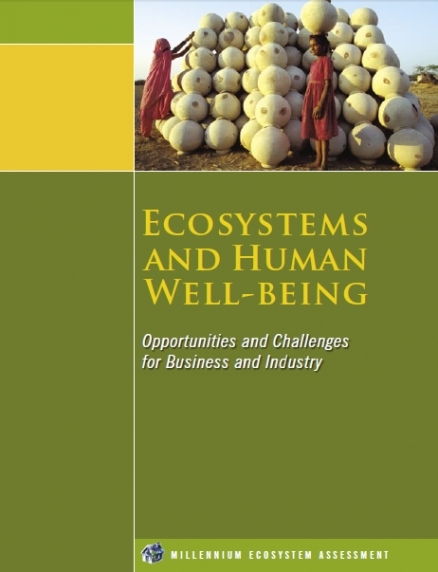Why the Millennium Ecosystem Assessment Is Important for Business and Industry
Ecosystems and Human Well-being: Opportunities and Challenges for Business and Industry: Why the Millennium Ecosystem Assessment Is Important for Business and Industry
This is part of the Millennium Ecosystem Assessment report Ecosystems and Human Well-being: Opportunities and Challenges for Business and Industry
Businesses interact with ecosystems and ecosystem services in two important ways: they use services and they contribute to ecosystem change. The MA discovered that two thirds of the ecosystem services it examined are being degraded or used unsustainably. This finding has serious ramifications for the world at large and will affect business and industry in three principal ways.
- If current trends continue, ecosystem services that are freely available today will cease to be available or become more costly in the near future. Once internalized by primary industries, additional costs that result will be passed downstream to secondary and tertiary industries and will transform the operating environment of all businesses.
- Loss of ecosystem services will also affect the framework conditions within which businesses operate, influencing customer preferences, stockholder expectations, regulatory regimes, governmental policies, employee well-being, and the availability of finance and insurance.
- New business opportunities will emerge as demand grows for more efficient or different ways to use ecosystem services for mitigating impacts or to track or trade services.
|
“Business cannot function if ecosystems and the services they deliver—like water, biodiversity, fiber, food, and climate—are degraded or out of balance.” —World Business Council for Sustainable Development |
Business cannot assume that there will be ample warning of a change in the availability of key services or that a company’s past responses to changes will be successful in the future. Ecosystems often change in abrupt, unpredictable ways. Most ecosystems are being altered by human actions in unprecedented ways. Consequently, it is difficult to predict the future state of an ecosystem or the availability of an ecosystem service. In addition, these uncertainties mean that past successes in ecosystem management may not apply to current or future conditions.
|
“The solutions of the past are often not robust enough under the conditions of global change and need to be re-thought and re-implemented.” —Antony Burgmans, Chairman, Unilever N.V. |
The MA provides a benchmark for public policy, public awareness, and the private sector; it will influence investments, the regulatory climate, and public opinion at national and international levels over the next 10 years. Using the findings of the MA can help ensure that a company’s ventures are informed by the best available scientific information. Factoring that information into plans will allow businesses to position themselves as innovators and market leaders. Failure to keep pace with these changes risks the loss of competitive advantage, brand reputation, and the license to operate, innovate, and grow.
Even though Earth’s natural capital is being eroded at a rapid rate, there is still time to lessen the impact and preserve options by building on a growing number of examples of good practice. The MA is designed to help decision-makers factor information about changes in ecosystems into their strategic planning. It provides a framework for the integrated management of multiple, interacting ecosystem services. The MA is the most comprehensive analysis to date of the many and complex ways in which people depend on and affect the natural environment.
|
“Businesses’ engagement in voluntary actions to reduce their impact on Earth’s ecosystems can be an engine of positive change in two ways: it can be a source of new opportunities for business, and a means of preserving our natural assets for future generations.” —Jonathan Lash, President World Resources Institute |
Terms of Use
The copyright for material on this page is the property of the World Resources Institute. Click here for the Terms of Use (Ecosystems and Human Well-being: Opportunities and Challenges for Business and Industry: Why the Millennium Ecosystem Assessment Is Important for Business and Industry).
Disclaimer: This chapter is taken wholly from, or contains information that was originally written for the Millennium Ecosystem Assessment as published by the World Resources Institute. The content has not been modified by the Encyclopedia of Earth.
|
|
